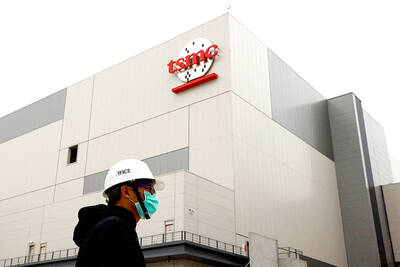Taiwan Semiconductor Manufacturing Co (TSMC, 台積電), the world’s largest contract chip maker, ranked among the top 10 spenders in research and development (R&D) in the global integrated circuit sector last year, according to a research report.
The report released by semiconductor market researcher IC Insights on Thursday showed TSMC raised its R&D expenses last year by 44 percent from 2009 to US$945 million (NT$27.44 billion), making it the 10th largest R&D spender among the global computer chip companies.
The company’s ranking in R&D spending surged compared to the previous year.
In 2009, TSMC spent US$656 million in R&D, making it the 19th largest spender in the industry, IC Insights said.
Last year, its R&D spending accounted for 7 percent of its total sales, and the firm became the first foundry operator to be included in the top 10 R&D spender rankings in the global IC business, the report said.
IC Insights called TSMC’s rise in the ranking “significant” as foundries usually spend a small amount of their sales on R&D, which range between 5 percent and 10 percent of revenue, compared with a range of 15 percent to 20 percent for integrated device manufacturers (IDMs) and fabless IC designers.
The IC market researcher said TSMC was expected to spend more than US$1.1 billion in R&D this year, up 20 percent from last year.
US giant Intel kept its largest R&D spender title last year by spending US$6.66 billion, an 18 percent rise from 2009, with the figure accounting for 17 percent of its total sales, IC Insights said.
Samsung Electronics of South Korea, meanwhile, rose a notch to rank as the second-largest spender last year, spending US$2.62 billion in R&D, which was 19 percent higher than 2009 and represented 8 percent of its revenue.
STMicroelectronics, a Geneva-headquartered IC firm, came in third in rankings for last year, down from second place in 2009, after spending US$2.33 billion in R&D, which fell 2 percent compared to the previous year, and made up 23 percent of its sales.

Stephen Garrett, a 27-year-old graduate student, always thought he would study in China, but first the country’s restrictive COVID-19 policies made it nearly impossible and now he has other concerns. The cost is one deterrent, but Garrett is more worried about restrictions on academic freedom and the personal risk of being stranded in China. He is not alone. Only about 700 American students are studying at Chinese universities, down from a peak of nearly 25,000 a decade ago, while there are nearly 300,000 Chinese students at US schools. Some young Americans are discouraged from investing their time in China by what they see

Taiwan Semiconductor Manufacturing Co (TSMC, 台積電), the world’s largest contract chipmaker, yesterday reported record sales for the first quarter, which analysts attributed to solid demand for emerging technologies. Consolidated revenue totaled NT$592.64 billion (US$18.51 billion) in the January-to-March period, up 16.5 percent from a year earlier, but down 5.26 percent from the previous quarter, TSMC said in a statement. The first-quarter revenue beat analysts’ average projection of NT$579.5 billion, Bloomberg News reported. That performance lends weight to expectations that the world’s most valuable chipmaker would return to solid growth this year after weathering a post-COVID-19-pandemic cratering of smartphone and computer sales. TSMC is budgeting

MAJOR DROP: CEO Tim Cook, who is visiting Hanoi, pledged the firm was committed to Vietnam after its smartphone shipments declined 9.6% annually in the first quarter Apple Inc yesterday said it would increase spending on suppliers in Vietnam, a key production hub, as CEO Tim Cook arrived in the country for a two-day visit. The iPhone maker announced the news in a statement on its Web site, but gave no details of how much it would spend or where the money would go. Cook is expected to meet programmers, content creators and students during his visit, online newspaper VnExpress reported. The visit comes as US President Joe Biden’s administration seeks to ramp up Vietnam’s role in the global tech supply chain to reduce the US’ dependence on China. Images on

US CONSCULTANT: The US Department of Commerce’s Ursula Burns is a rarely seen US government consultant to be put forward to sit on the board, nominated as an independent director Taiwan Semiconductor Manufacturing Co (TSMC, 台積電), the world’s largest contract chipmaker, yesterday nominated 10 candidates for its new board of directors, including Ursula Burns from the US Department of Commerce. It is rare that TSMC has nominated a US government consultant to sit on its board. Burns was nominated as one of seven independent directors. She is vice chair of the department’s Advisory Council on Supply Chain Competitiveness. Burns is to stand for election at TSMC’s annual shareholders’ meeting on June 4 along with the rest of the candidates. TSMC chairman Mark Liu (劉德音) was not on the list after in December last